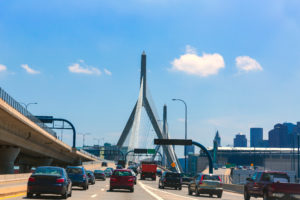
Mass. high court requires insurers to pay implied DV claims
By onAnnouncements | Insurance | Legal
Insurers that are liable to pay for repairs to a customer’s vehicle after a crash must also reimburse their customers for the implied diminished value (IDV) of their vehicles after repairs are made, the Massachusetts Supreme Judicial Court has ruled.
In a unanimous ruling issued on Oct. 19, the state’s highest court found that because Part 4 of the Standard Massachusetts Automobile Policy “does not limit recovery to merely repair or replacement costs, such recovery must compensate a claimant for any loss of value the claimant incurred as a result of a collision, offset by the increase in value that may occur from repairs to the vehicle.
“In short, if a third-party claimant’s vehicle suffers IDV even after it is fully repaired, then under part 4 of the standard policy, the insurer may be liable to the claimant for IDV damages so that he or she may be ‘made whole’ once again,” the justices wrote in a 17-page ruling. “The law attempts to put the plaintiff in a position as nearly as possible equivalent to his [or her] position before the tort.”
The additional payment is meant to compensate owners for a loss in value, because vehicles that have been damaged in accidents sometimes sell for below-market amounts, even after proper repairs have been made.
 Previously, Part 4 had not been interpreted as covering IDV. Part 4 states, in full, “Under this part, we will pay damages to someone else whose auto or other property is damaged in an accident. The damages we will pay are the amounts that person is legally entitled to collect for property damage through a court judgment or settlement. We will pay only if you, or a household member, is legally responsible for the accident. We will also pay if someone else using your auto with your consent is legally responsible for the accident. Damages include any applicable sales tax and the costs resulting from the loss of use of the damaged property.”
Previously, Part 4 had not been interpreted as covering IDV. Part 4 states, in full, “Under this part, we will pay damages to someone else whose auto or other property is damaged in an accident. The damages we will pay are the amounts that person is legally entitled to collect for property damage through a court judgment or settlement. We will pay only if you, or a household member, is legally responsible for the accident. We will also pay if someone else using your auto with your consent is legally responsible for the accident. Damages include any applicable sales tax and the costs resulting from the loss of use of the damaged property.”
“The plaintiffs argue that they are entitled to collect IDV damages from the defendants under part 4 of the standard policy because IDV damages are included as part of ‘the amounts [the claimant] is legally entitled to collect for property damage through a court judgment or settlement,'” the ruling states. “We agree with the plaintiffs.”
However, the justices stopped short of ruling that IDV can be assumed in all cases when a vehicle has been damaged and repaired. “Rather, and as other jurisdictions have held, individualized proof is required to demonstrate that a given automobile has sustained some form of diminution in value due to a collision or vehicular accident, even after repairs are made. Specifically, a plaintiff must establish (1) that his or her vehicle has suffered IDV damages, and (2) the amount of IDV damages at issue,” the ruling states.
Billy Walkowiak, founder and CEO of Collision Safety Consultants, a nationwide company that advises consumers on DV appraisals, said his company had stopped taking on cases in Massachusetts because of the state’s lack of legislation or case law recognizing the customer’s right to be reimbursed for IDV.
Walkowiak, a North Carolina and South Carolina Superior Court-certified DV expert witness, said that, in his experience, every claim for IDV in Massachusetts has been rejected, because insurers realize that the state has not recognized the right to reimbursement.
He noted that just two states, Georgia and North Carolina, have laws establishing the customer’s right to be reimbursed for IDV. In fact, in Georgia, the right is extended to first-party claims — those not caused by a third party.
In several other states, he added, the right to be reimbursed has been established through litigation. “Every one is different, and every one is worded different,” Walkowiak said.
 The SJC decision stems from a civil suit brought in Superior Court by Jarrett McGilloway, whose vehicle had been involved in a collision caused by a parking lot employee. The at-fault driver’s insurer, Safety Insurance Company, agreed that its insured was liable, and paid for the repairs to McGilloway’s vehicle.
The SJC decision stems from a civil suit brought in Superior Court by Jarrett McGilloway, whose vehicle had been involved in a collision caused by a parking lot employee. The at-fault driver’s insurer, Safety Insurance Company, agreed that its insured was liable, and paid for the repairs to McGilloway’s vehicle.
However, Safety refused to pay McGilloway’s claim for his vehicle’s IDV. McGilloway filed suit over the refusal on June 30, 2017. His suit was later was consolidated with similar suits brought by two other consumers.
In an order addressing both plaintiffs’ and defendants’ motions for summary judgment, a Suffolk Superior Court judge denied McGilloway’s claim, citing state regulations.
“By regulation, an appraiser must document all physical damage caused by a collision, but is not required to do anything to compare the value of the vehicle before the collision with its value once it is fully repaired,” Judge Kenneth W. Salinger wrote.
“Similarly, by regulation a damaged vehicle is a total loss if the salvage value of the damaged vehicle plus the total cost to fully repair the vehicle exceeds the actual cash value of the vehicle immediately before the collision, without taking into account any IDV that may remain after the vehicle is fully repaired,” Salinger wrote.
That decision was overturned by the SJC. “Contrary to the defendants’ assertions, our case law does not foreclose the plaintiffs from recovering IDV damages as third-party claimants under part 4 of the standard policy,” the high court ruled.
“In discerning the meaning of the contract provisions, we are guided by ‘what an objectively reasonable insured, reading the relevant policy language, would expect to be covered,'” the justices wrote, referencing case law.
In oral arguments before the high court, a representative for Commerce argued that a decision in favor of the plaintiffs would “cause a seismic shift in the insurance marketplace,” which in turn would “economically destabilize the insurance marketplace.”
Commerce’s lawyer also argued that IDV damages are “very difficult, if not impossible” to calculate. However, the SJC noted that Safety “admits that IDV may be suffered in some cases” and “concedes that IDV may be quantifiable.” In fact, several states recognize and allow recovery of IDV damages, the justices noted.
The case now goes back to Superior Court, where McGilloway and the two other plaintiffs will have prove that their vehicles have suffered IDV damages, and establish the amount at issue.
IDV will be among the subjects covered at the SCRS Repairer Driven Education session “Be Memorable: Uncover Hidden Value for your Customer, in their Claim,” at the SEMA Show on Tuesday, Nov. 2. The session will be presented by John Walczuk, president at ZB Claim Services, Inc., and Allen Lipp, president at Automotive Consulting Professionals.
More information:
AASP-NJ: ‘Neat’ cases guide shops, insurers on DV, storage, loss of use
Ohio auto body shop loses appeal of attorney fees, DV over incorrectly repaired Nissan Maxima
Images:
Traffic passes over the Boston Zakim Bridge. (Lunamarina/iStockphoto)
The John Adams Courthouse in Boston, home of the Massachusetts Supreme Judicial Court. (Swampyank/English Wikipedia)
A wood gavel stands in front of the Massachusetts state flag. (Baris-Ozer/iStockphoto)
